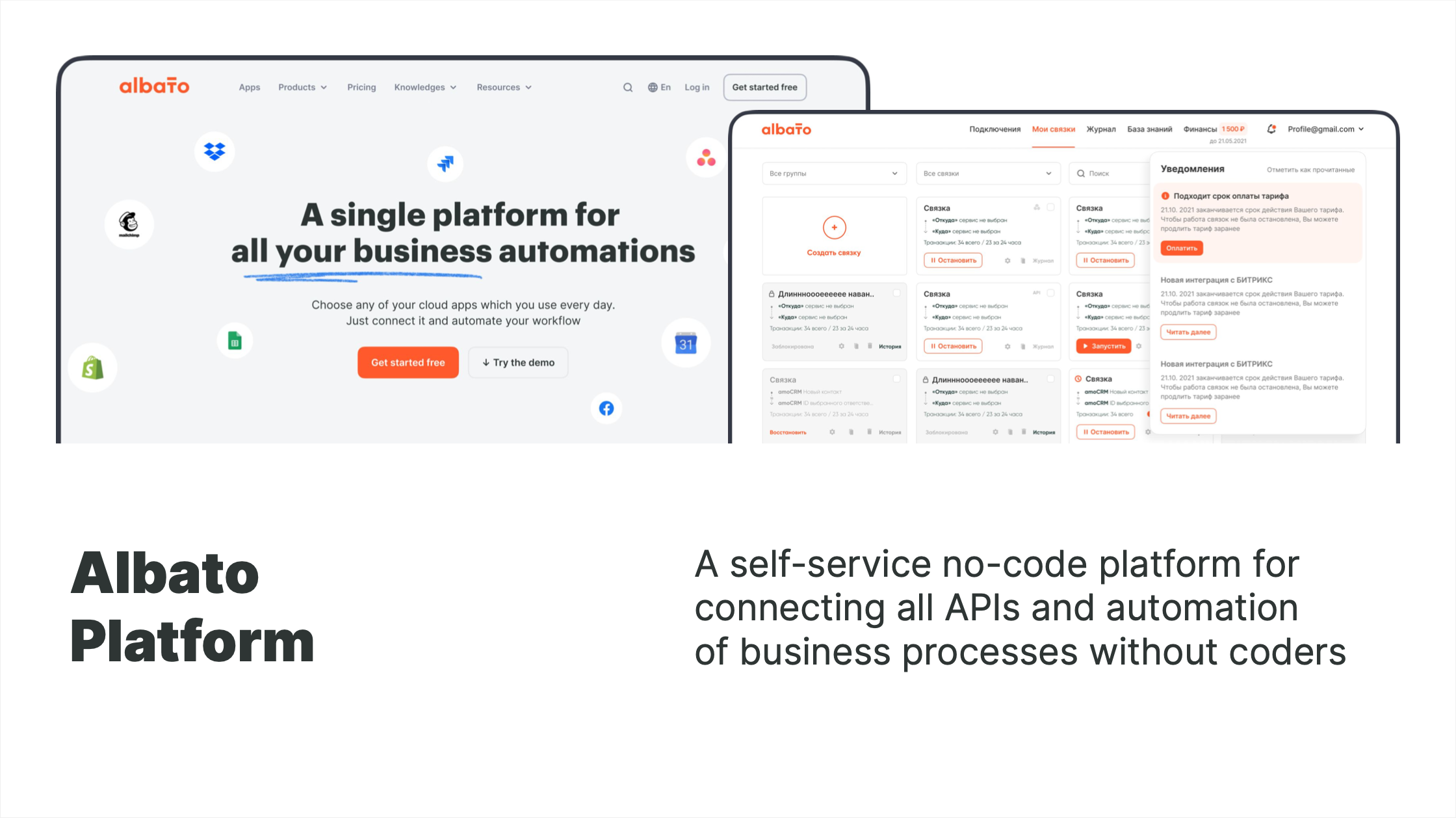Automating your business with Albato is straightforward and effective. This tool simplifies tasks, saving you time and effort.
In today’s fast-paced world, efficiency is crucial for business success. Albato offers a powerful solution to help manage repetitive tasks and streamline operations. By automating processes, you can focus on more important activities, like growing your business. Albato connects various apps and tools, allowing seamless integration and workflow automation.
This not only reduces manual work but also minimizes errors. Understanding how to use Albato can significantly enhance your business’s productivity. This guide will walk you through the steps to automate your business with Albato, ensuring you make the most of this valuable tool.
Introduction To Albato
Welcome to the world of business automation. Say hello to Albato, a tool designed to streamline your operations. Whether you run a small shop or a large company, Albato can help you save time and reduce errors. Let’s dive into what makes Albato a valuable asset for your business.
What Is Albato?
Albato is a cloud-based automation platform. It connects your apps and services to work together seamlessly. No coding skills are needed. Create workflows that automate repetitive tasks. Albato does the heavy lifting for you.
Benefits Of Automation
Automation with Albato brings several benefits. First, it saves time. Automate routine tasks to focus on what matters most. Second, it reduces human error. Automated systems follow set rules without fail. Third, it improves efficiency. Streamlined processes lead to better performance. Last, it enhances scalability. As your business grows, so can your automated workflows.
In short, Albato makes your business smarter and your life easier. Start automating today and see the difference.

Credit: www.capterra.ie
Setting Up Albato
Setting up Albato is the first step towards automating your business. This guide will help you create an account and navigate the dashboard.
Creating An Account
To start, visit the Albato website. Click on the Sign Up button. You will see a form. Fill in your name, email, and password. Confirm your email address by clicking the link sent to your inbox. You are now ready to use Albato.
Navigating The Dashboard
Once logged in, you will see the dashboard. The dashboard is user-friendly. It has several sections:
- Integrations: Connect different apps.
- Automations: Create workflows.
- Settings: Manage your account settings.
Each section helps you manage different aspects of automation. Explore each section to familiarize yourself with the features. Begin with Integrations to connect your apps. Then move to Automations to set up workflows.
The dashboard also has a search bar. Use it to quickly find features and settings. The user interface is simple and intuitive. Spend some time exploring to get comfortable.
Connecting Applications
Connecting applications is a crucial step in automating your business with Albato. It enables seamless workflows and efficient data transfer between your favorite tools. By integrating different apps, you can save time, reduce manual tasks, and enhance productivity.
Supported Apps
Albato supports a wide range of applications. These include popular tools like Gmail, Slack, Trello, and more. You can also connect CRM systems, e-commerce platforms, and social media apps. The list is extensive, ensuring you find the tools you need.
Integration Process
The integration process with Albato is straightforward. First, sign up for an Albato account. Next, navigate to the dashboard and select the apps you wish to connect. Follow the prompts to authorize each app. Within minutes, your apps will be linked and ready to automate tasks.
Albato provides a user-friendly interface to manage integrations. You can customize workflows to suit your business needs. Set triggers and actions to automate repetitive tasks. Monitor the status of your integrations from the dashboard. It’s that simple.
Creating Automation Scenarios
Creating automation scenarios with Albato can greatly enhance your business efficiency. This process involves defining triggers and setting actions that streamline your tasks. By automating repetitive tasks, you save time and reduce errors. Let’s explore how to create these automation scenarios step-by-step.
Defining Triggers
A trigger is an event that starts the automation. Think of it as the starting point. For example, receiving a new email can be a trigger. To define a trigger in Albato, choose an app and specify the event. It could be a new lead in your CRM or a new order in your e-commerce store.
Make sure the trigger is relevant to your workflow. The right trigger ensures your automation runs smoothly. It helps to keep your business processes in sync. Defining clear triggers is the first step in creating effective automation.
Setting Actions
Once the trigger is set, the next step is to define actions. Actions are tasks that Albato performs when the trigger occurs. For example, sending a follow-up email when a new lead is added. To set an action, choose an app and specify the task you want to automate.
Actions can range from sending notifications to updating records. They help automate your workflow and ensure tasks are completed. Setting the right actions can save a lot of time and reduce manual effort.
By combining triggers and actions, you create powerful automation scenarios. These scenarios help you manage your business more effectively. Albato makes it easy to set up and manage these automations. Start automating your business today and see the difference.
Optimizing Workflows
Automating your business with Albato can significantly improve your workflows. Streamlining tasks and processes reduces manual work. This allows you to focus more on strategic activities. In this section, we will discuss how to optimize workflows using Albato.
Using Filters
Filters help you manage data effectively. You can set rules to sort and prioritize information. For instance, filter emails by sender or subject. This ensures only important emails get your attention. Filters save time and improve efficiency.
| Filter Type | Usage |
|---|---|
| Sort by sender, subject, or date | |
| Leads | Filter by source, status, or region |
Conditional Logic
Conditional logic adds flexibility to your workflows. It allows actions based on specific conditions. For example, send a follow-up email if a lead responds. If they don’t respond, move them to a different list.
- If a new lead comes in, then assign it to a salesperson.
- If an invoice is overdue, then send a reminder.
- If a customer gives a low rating, then trigger a support ticket.
Using these tools can make your business run smoother. Optimize workflows, save time, and reduce errors. Start automating with Albato today!

Credit: m.youtube.com
Monitoring And Managing Automations
Automating your business with Albato can save time and effort. But it’s crucial to monitor and manage these automations effectively. This ensures everything runs smoothly. Regular checks can help you track performance and troubleshoot issues quickly.
Tracking Performance
Albato provides tools to help you track the performance of your automations. You can see how well each automation is working. This involves checking the number of successful and failed tasks. Monitoring these metrics helps you understand the efficiency of your workflows.
- Number of tasks completed
- Success rate of automations
- Error rate and its frequency
Using these insights, you can identify areas that need improvement. It helps you make data-driven decisions. You can also set up notifications to alert you when an automation fails. This way, you can address issues promptly.
Troubleshooting Issues
Even the best automations can face issues. Albato makes it easy to troubleshoot problems. The platform provides detailed logs and error messages. These logs help you understand what went wrong.
Here’s a simple way to troubleshoot:
- Check the error logs for specific messages.
- Identify the step where the automation failed.
- Review the settings and data used in that step.
- Make necessary adjustments and test the automation again.
Albato also offers a support community where you can ask for help. You can share your issues and get solutions from other users. This community can be a valuable resource for solving complex problems.
Advanced Features
Automating your business processes with Albato can save time and boost efficiency. Albato offers several advanced features to enhance your automation experience. These features provide flexibility and customization, making it easier to manage complex workflows.
Multi-step Automations
With Albato, you can create multi-step automations to handle intricate tasks. This feature allows you to chain multiple actions together, creating a seamless workflow. For example, you can set up an automation where a new order triggers an email confirmation, updates your CRM, and creates a task in your project management tool.
Here’s how you can set up a multi-step automation:
- Choose a trigger event, like receiving a new order.
- Add subsequent actions, such as sending an email.
- Include additional steps, like updating your CRM and creating a task.
Multi-step automations ensure that no step is missed, keeping your processes smooth and reliable.
Custom Scripts
Albato’s custom scripts feature allows for even more personalized automation. This feature is perfect for users with specific requirements not covered by standard actions. By writing custom scripts, you can tailor automations to fit your unique business needs.
Benefits of using custom scripts:
- Greater flexibility in defining actions.
- Ability to integrate with unique or less common tools.
- Customized responses based on specific conditions.
For instance, you can write a script that processes data from a form and sends it to a custom API. This way, you can automate tasks specific to your business without relying on predefined actions.
Custom scripts enable you to push the limits of automation, ensuring every aspect of your workflow is covered.
Security And Compliance
Ensuring security and compliance is essential for any business. When automating processes with Albato, you must prioritize data protection and adhere to compliance standards. Let’s dive into these crucial aspects.
Data Protection
Albato takes data protection very seriously. They use advanced encryption methods to safeguard your data. This ensures all your information is secure.
Your data is encrypted both in transit and at rest. This means it is protected during transfers and while stored. Only authorized personnel can access sensitive data.
Albato also implements regular security audits. These audits help identify and fix potential vulnerabilities. They are committed to providing top-notch security for your business.
Compliance Standards
Compliance with industry standards is crucial for building trust. Albato adheres to various compliance standards to ensure your business meets regulatory requirements.
Here are some of the compliance standards Albato follows:
- GDPR: Ensures data protection and privacy for all individuals within the EU.
- HIPAA: Protects sensitive patient information in the healthcare sector.
- PCI-DSS: Secures credit card transactions against data breaches.
These standards help maintain the integrity and security of your data. By adhering to these regulations, Albato ensures your business operates within legal boundaries.
Albato also provides detailed documentation and support. This helps you understand the compliance requirements specific to your industry. Ensuring compliance is a shared responsibility, and Albato is here to assist you.
Success Stories
Businesses thrive when they find the right tools. Albato helps businesses automate tasks and save time. Let’s explore some success stories that highlight how Albato makes a difference.
Case Studies
Many companies have transformed with Albato. Here are a few case studies:
| Company | Industry | Results |
|---|---|---|
| Tech Innovators | Technology | Improved workflow efficiency by 40% |
| HealthPlus | Healthcare | Reduced manual tasks by 60% |
| EduLearn | Education | Saved 20 hours a week on admin tasks |
User Testimonials
Users love how Albato simplifies their work. Here are some testimonials:
- John, Tech Innovators: “Albato cut our task time in half.”
- Sarah, HealthPlus: “We can focus on patient care now.”
- Mike, EduLearn: “Our team is more productive with Albato.”
These stories show Albato’s impact. It helps businesses succeed by automating tasks. Try Albato and see the difference.

Credit: albato.com
Frequently Asked Questions
What Is Albato?
Albato is an automation platform. It connects different apps to automate tasks.
How Does Albato Work?
Albato links your apps. It creates workflows to automate repetitive tasks.
Can Albato Save Time?
Yes, Albato saves time. It handles tasks automatically, reducing manual work.
Is Albato Easy To Use?
Yes, Albato is user-friendly. Its interface is simple and intuitive.
Conclusion
Albato simplifies business automation. It saves time and reduces errors. Users can integrate apps effortlessly. This boosts productivity and efficiency. Automation with Albato is straightforward and user-friendly. Businesses can scale operations smoothly. Start automating today for better results.
